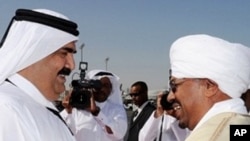The most powerful Darfur rebel group, the Justice and Equality Movement, is scheduled to sign a truce with Sudanese President Omar Hassan al-Bashir Tuesday in Doha, Qatar. The deal, negotiated in the Chadian capital N'Djamena, was spurred along by the recent pledge from Sudan and Chad to quit fueling the proxy war on their border.
The cease-fire is supposed to lay the groundwork for a formal peace deal to be completed by March 15, though a Justice and Equality Movement spokesman told Reuters that such a deadline was unrealistic. The final agreement is to incorporate elements of power-sharing, prisoner amnesty, and the integration of rebel forces in the Sudanese army. Other rebel groups have not signed on to the deal.
Also expected in attendance at the signing ceremony is Chadian President Idriss Deby, whose presence underscores the shadow role that Sudan's western neighbor has played both in fueling the long-running war in the Darfur region, and, now, in possibly ending this segment of the conflict.
A senior communication official in Bashir's ruling party, Rabi Abdulaati, told VOA that the apparent rapprochement between the two countries set the stage for the agreement.
"The normalization of relations between Chad and Sudan definitely has a great role in this breakthrough between JEM and the Sudan government. I think also the visit by the president of Chad also has resulted in this frame agreement between the two parties," Abdulaati said.
JEM was one of two main rebel groups that rose against Khartoum in 2003, complaining of the western region's marginalization. Most agree that JEM is now the strongest of the fractured Darfur rebel groups on the ground.
The group's leader, former government official Khalil Ibrahim, is from the Zaghawa tribe, as is most of JEM's leadership. Chadian President Deby is also Zaghawan, and has been accused of arming Ibrahim's rebellion in Darfur.
But this month at a rare meeting between the Sudanese and Chadian heads of states, the two agreed to end support for each other's rebellions. President Bashir is facing an election in April and is hoping to shore up support and stability in the vote-rich Darfur region, and President Deby is also beginning to get ready for upcoming polls.
Analysts say Chad's support for the peace arrangement could be the key factor that separates this cease-fire from previous short-lived deals. JEM is already claiming that Sudanese forces have broken the truce, though the rebel group says it is still committed to the peace framework.
If the deal does manage to result in an end of hostilities between JEM and Khartoum, comprehensive peace in Darfur will still likely remain an elusive goal.
The other main rebel group on the ground, the Sudan Liberation Movement faction still aligned to exiled-leader Abdel Wahid al-Nur, has refused to join the peace talks. While JEM holds Islamist ideological ties with the Khartoum regime, SLA is an ethnic Fur-dominated rebellion seeking secular rule. Paris-based founder Abdel Wahid is reported to continue to enjoy wide popular support among the displaced populations on the ground.
More than 300,000 were killed and millions displaced in the conflict as Khartoum mobilized Arab militias to destroy the rebels' bases of support. Khartoum rejects the casualty figures.
Darfur Truce Follows Chad-Sudan Rapprochement
- By Alan Boswell

Darfur rebel group, backed by Chad, to sign power-sharing deal with Sudanese president; comprehensive peace likely to remain elusive










